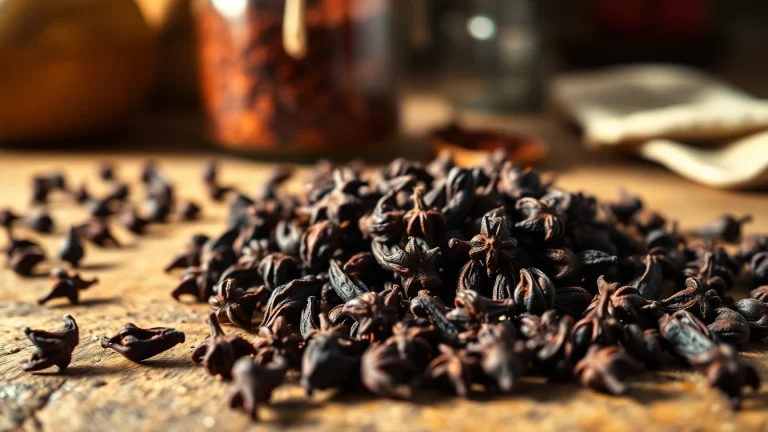
Unlock the Flavor and Benefits of Cloves: A Comprehensive Guide
Introduction to Cloves
Cloves, known scientifically as Syzygium aromaticum, are the dried flower buds of a tree that belongs to the family Myrtaceae. This aromatic spice is not just a culinary essential but also a topic of fascination due to its rich history, how it is harvested, and its multitude of benefits. From being a key ingredient in various dishes to serving medicinal purposes, cloves are a spice that holds a prominent place in kitchens and pharmacies alike. In this article, we’ll explore the background, benefits, culinary uses, and cultural significance of cloves, revealing why they are cherished globally. For a deep dive into the essence of this aromatic spice, consider checking out Cloves.
What are Cloves?
Cloves are aromatic flower buds that grow on the clove tree, a tropical evergreen native to the Maluku Islands in Indonesia. They are harvested before they bloom, when they are still immature. Traditionally, these buds are sun-dried until they turn a reddish-brown color, creating the enticing and spicy flavor profile associated with cloves.
The spice has a strong, pungent flavor that is both sweet and bitter, making it a versatile ingredient in both sweet and savory dishes. Cloves are not only valued for their flavor but also for their high content of eugenol, a compound that contributes to their unique aroma and potential health benefits.
The History and Origin of Cloves
The history of cloves dates back to ancient times. They were first used as a spice in the Maluku Islands, where they were highly prized by traders. Cloves have been mentioned in literature as far back as the Han Dynasty in China (206 BCE – 220 CE), where they were used to flavor food and as a mouth freshener.
During the Age of Discovery in the 15th and 16th centuries, cloves became a highly sought-after commodity in Europe, where they were used not only in cooking but also in medicinal practices. The Dutch and Portuguese fought for control over the clove trade, leading to significant historical events such as battles and the signing of treaties. Eventually, cloves were cultivated in other regions, including Zanzibar and Madagascar, contributing to their widespread availability and consumption today.
How Cloves are Harvested and Processed
The harvesting of cloves is a meticulous process that requires careful timing. Clove buds are typically harvested when they are still unopened and show a pinkish hue. This usually occurs in the late spring or early summer. After harvesting, the buds are dried under the sun for several days, turning them into the familiar brown spice that graces our tables.
Once dried, the cloves are sorted based on size and quality. Higher-quality cloves are often larger and more aromatic. The processing of cloves requires careful handling to preserve their potent flavors, and this delicacy reflects in their pricing and culinary applications.
Health Benefits of Cloves
Beyond their culinary allure, cloves are packed with health benefits that contribute to overall well-being. They are rich in nutrients, antioxidants, and essential oils that serve various therapeutic purposes.
Nutritional Profile of Cloves
Cloves are not just a flavorful spice; they boast an impressive nutritional profile. They are an excellent source of manganese, an essential mineral that plays a crucial role in bone formation, blood sugar regulation, and antioxidant defense. Furthermore, they contain vitamins like vitamin K, vitamin C, and several micronutrients, including magnesium and calcium, all contributing to their health benefits.
Antioxidant Properties and Their Importance
Cloves are renowned for their high antioxidant content, which is primarily attributed to the compound eugenol. Antioxidants help combat oxidative stress in the body, reducing the risk of chronic diseases such as heart disease and cancer. The presence of antioxidants also aids in enhancing liver function and promoting overall health.
A study published in the “Journal of Food Science” found that cloves possess one of the highest antioxidant capacities among spices, making them a superb addition to a health-conscious diet.
Potential Therapeutic Uses of Cloves
Cloves have been studied for their medicinal properties and potential therapeutic uses. Research suggests they can aid in digestive health by alleviating gas and bloating. Additionally, studies highlight cloves’ roles in oral health, particularly due to eugenol’s natural analgesic and antiseptic properties.
Moreover, cloves may have anti-inflammatory properties that could benefit respiratory conditions. Drinking clove-infused teas or using clove oil are popular traditions to support respiratory health. As always, consult with healthcare professionals before starting any new health regimen.
Using Cloves in Cooking
Cloves are a versatile spice and can elevate both savory and sweet dishes. Their warm and sweet flavor profile pairs well with various ingredients, making them a beloved spice in many cuisines.
Popular Culinary Uses for Cloves
Cloves are a staple in various global cuisines. In Indian cuisine, they are often used in garam masala and biryani, adding depth and complexity. In Western cooking, they find their way into holiday treats like gingerbread cookies, spiced cakes, and mulled wines.
Additionally, cloves are frequently used in pickling spices and as a flavoring agent in savory dishes such as stews and meats, where their strong flavor can enhance the overall taste profile.
How to Properly Store Cloves
To preserve the flavor and aroma of cloves, it is essential to store them properly. Whole cloves should be kept in an airtight container in a cool, dark place away from sunlight. Ground cloves, on the other hand, should be used within six months for optimum freshness, as their flavor diminishes over time.
Storing cloves in a tightly sealed glass jar helps maintain their integrity and extends their shelf life, making them a reliable ingredient for your kitchen.
Creative Recipes Featuring Cloves
Cloves can be utilized in countless recipes, both traditional and modern. Here are a few creative ways to incorporate them into your meals:
- Clove-Infused Rice: Add a couple of whole cloves while cooking rice to impart a subtle, aromatic flavor.
- Spiced Apple Cider: Simmer apple cider with cloves, cinnamon, and orange zest for a warming beverage during the colder months.
- Clove and Honey Glazed Ham: Mix ground cloves with honey to create a glaze for baked ham, giving it a sweet and spicy kick.
Clove Oil: Extracting and Usage
Clove oil, derived from the flower buds, leaves, and stems of the clove tree, is highly concentrated and possesses various therapeutic properties. The extraction process usually involves steam distillation, which preserves its potent properties.
Benefits of Clove Oil
Clove oil is well-known for its various health benefits, including its analgesic properties. It is often used in dental care products to alleviate toothaches and act as a natural anesthetic. Furthermore, clove oil exhibits antibacterial properties, making it useful in household cleaning products and personal care items.
Additionally, it can be used in aromatherapy to relieve stress, boost mood, and improve overall wellness, providing a natural solution to everyday ailments.
How to Make Clove Oil at Home
Making homemade clove oil is simple and allows you to harness its properties effectively. Here’s a basic recipe:
- Ingredients: Whole cloves, carrier oil (like olive or coconut oil).
- Method: Fill a jar with whole cloves and cover them with your chosen carrier oil. Seal the jar and let it sit in a dark, warm place for about two weeks, shaking it occasionally.
- Strain: After two weeks, strain the oil to remove the cloves. Store the clove oil in a dark glass bottle in a cool place.
Common Uses of Clove Oil in Wellness
Clove oil can be used in a variety of ways to bolster health and wellbeing. It can be effective for respiratory issues when added to a diffuser or used in steam inhalation. Many people incorporate it into massage oils for its warming properties to help soothe sore muscles.
It’s also popular in home remedies for skin conditions, as its antimicrobial properties can aid in the treatment of acne and infections. Always perform a patch test before applying clove oil topically to ensure there is no adverse reaction.
Cloves in Culture and Tradition
Cloves hold significant value not just in cooking but also in various cultural practices around the world. Their historical importance and symbolic meanings contribute to their revered status.
Cloves in Traditional Medicine
Throughout history, cloves have been incorporated into various traditional medicines. In Ayurvedic practices, cloves are utilized for their digestive benefits and ability to enhance overall health. Their warming qualities make them a common choice in herbal teas designed to alleviate cold symptoms.
In traditional Chinese medicine, cloves are employed to improve circulation and promote digestive health, showcasing their versatility in various cultures.
Symbolism of Cloves in Different Cultures
In many cultures, cloves symbolize protection and purification. They are often burned in homes to ward off negativity and enhance emotional clarity. In some Asian cultures, cloves represent love and unity, and they are used in various rituals and celebrations.
Cloves in Modern Practices: A Cultural Revival
Today, cloves are experiencing a revival in modern practices, with an increasing emphasis on holistic health and natural remedies. Many consumers are rediscovering traditional uses for cloves, including in herbal teas and natural skincare, blending their historical significance with contemporary wellness trends.
As people seek sustainable and holistic approaches to health, cloves remain a powerful symbol of both tradition and modern wellness.


